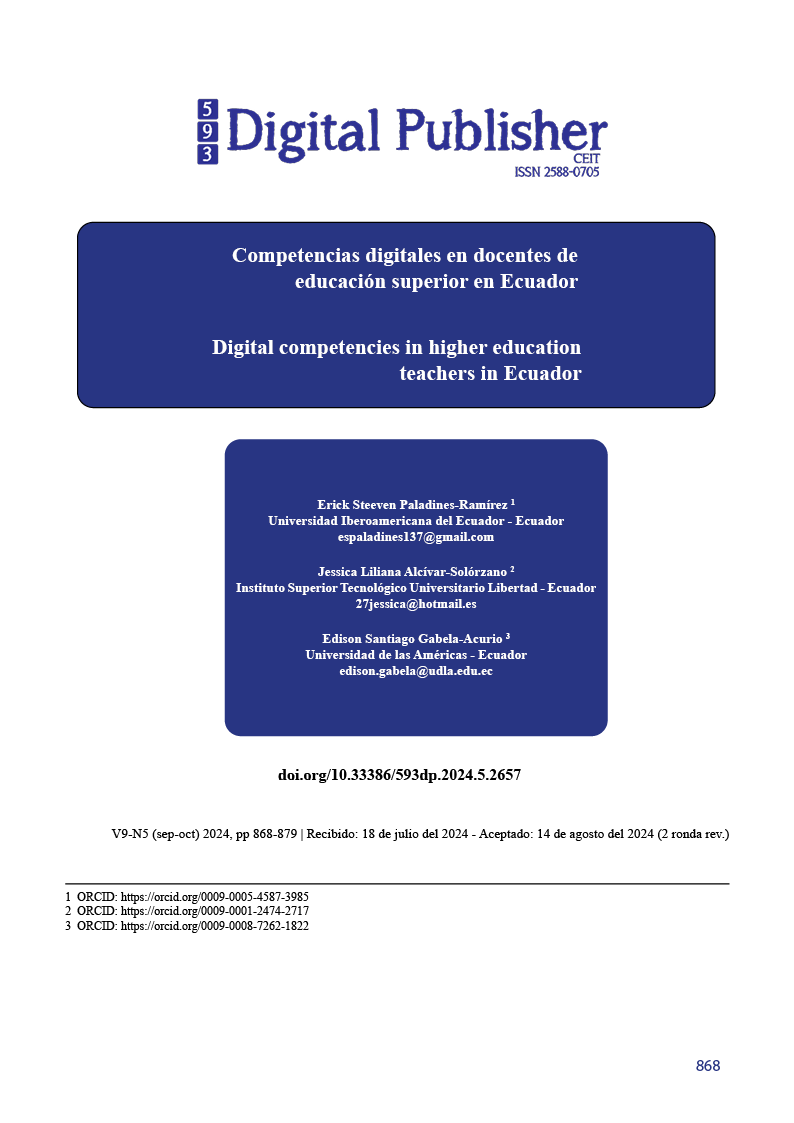Digital competences in higher education teachers in Ecuador
Main Article Content
Abstract
The study evidences the level of digital competencies among higher education faculty and how these influence their practice and interaction with students. Using a descriptive, non-experimental design, a survey was conducted with 120 educators from universities, technical institutes, and technological institutions. This survey evaluated the frequency of access to and use of digital sources, the available technological infrastructure, and the adoption of IT tools for teaching and assessment. The main conclusions state that faculty members access most of the information related to their profession through digital sources, which they use to prepare their classes. However, the use of creative tools is less common. Regarding technological infrastructure, a significant portion of respondents consider the equipment adequate for teaching, although some find issues with its suitability. The adoption of alternative software for assessment is limited, with only a fraction of educators using it. Notably, there is regular use of social media and other IT tools to interact with students outside the classroom. These findings underscore the need to enhance these competencies to ensure optimal education. Despite the significant integration of ICT in pedagogical practices, challenges remain in acquiring new technologies and continuous professional development. The importance of developing robust digital competencies is highlighted to meet the challenges of the 21st century and advance educational quality.
Downloads
Article Details

This work is licensed under a Creative Commons Attribution-NonCommercial-ShareAlike 4.0 International License.
1. Derechos de autor
Las obras que se publican en 593 Digital Publisher CEIT están sujetas a los siguientes términos:
1.1. 593 Digital Publisher CEIT, conserva los derechos patrimoniales (copyright) de las obras publicadas, favorece y permite la reutilización de las mismas bajo la licencia Licencia Creative Commons 4.0 de Reconocimiento-NoComercial-CompartirIgual 4.0, por lo cual se pueden copiar, usar, difundir, transmitir y exponer públicamente, siempre que:
1.1.a. Se cite la autoría y fuente original de su publicación (revista, editorial, URL).
1.1.b. No se usen para fines comerciales u onerosos.
1.1.c. Se mencione la existencia y especificaciones de esta licencia de uso.
References
Calderón, E., Cuenca, C., Chica, R., Sánchez, B., y Obando, F. (2023). La educación en el SigloXXI: Desafíos y Oportunidades (1a ed.). CID - Centro de Investigación y Desarrollo.https://biblioteca.ciencialatina.org/wp-content/uploads/2023/11/La-Educacion-en-el-Siglo-XXI-Desafios-y-Oportunidades.pdfCuberos de Quintero, M., y Vivas García, M. (2024). Relación entre didáctica, gerencia y el usoeducativo de las TIC. Actualidades Investigativas En Educación, 17(1).https://revistas.ucr.ac.cr/index.php/aie/article/view/27198/27302Esteve Mon, F. M. (2015). Análisis de la autopercepción y evaluación del desempeño de losestudiantes universitarios de educación por medio de un entorno 3D [Tesis doctoral,Universitat Rovira i Virgili].https://www.tdx.cat/bitstream/handle/10803/291441/tesis.pdfEuropean Union. (2024) 5464/18. Recommendation of the European Parliament and of theCouncil on key competences for lifelong learning. Recuperado de https://eur-lex.europa.eu/LexUriServ/LexUriServ.do?uri=OJ:L:2006:394:0010:0018:en:PDFGrados, J., Canales, C., Cuzcano, A., Mendoza, F., Leva, A., Meza, J. (2023). Capacidades delos sistemas educativos latinoamericanos para la aplicación de las herramientasdigitales como el aula invertida (1ª ed.). Perú: MarCaribe.https://osf.io/preprints/osf/q5zbxHarari, Y. (2018). 21 Lecciones para el siglo XXI (Agosto 2018, Vol. 1) [Sitio Web].https://www.pratec.org/wpress/pdfs-pratec/21-lecciones-para-el-siglo-XXI.pdfLázaro, L., y Gisbert, M. (2016). El desarrollo de la competencia digital docente a partir de unaexperiencia piloto de formación en alternancia en el Grado de Educación. Educar, 51(2).https://educar.uab.cat/article/view/v51-n2-lazaro-gisbert/725-pdf-esMoscoso, K., Beraún, M., Nieva, M., Sandoval, J. (2021). Competencias digitales y rendimientoacadémico en estudiantes universitarios: una mirada desde la educación no presencial.ETECAM. http://www.etecam.com/index.php/etecam/article/view/10/354Mendoza, R., Bellodas, M., Ortiz, C., Puelles, L., Asnate, E., Zambrano, J. (2023). Desafíosinterdisciplinarios para los docentes de aprendizaje virtual (1a ed.). Mar Caribe.https://osf.io/preprints/osf/jqku6Murillo, F. J., y Duk, C. (2020). The Covid-19 and the educational gaps. Revistalatinoamericana de educación inclusiva, 22(1). https://dx.doi.org/10.4067/S0718-73782020000100011Negroponte, N. (2024). El Mundo Digital (1.a ed.) [Sitio Web].https://users.dcc.uchile.cl/~cgutierr/cursos/INV/serDigital.pdfOcaña, Y., Valenzuela, L., y Garro, L. (2019). Inteligencia artificial y sus implicaciones en laeducación superior. Propósitos y Representaciones, 7(2), 552.https://revistas.usil.edu.pe/index.php/pyr/article/view/274/552Díaz, D., Loyola, E. (2020). Competencias digitales en el contexto COVID-19: una miradadesde la educación. Revista Innova Educación, 2(2).https://revistainnovaeducacion.com/index.php/rie/article/view/181/212Rodríguez Martínez, A. J. (2021). Competencias Digitales Docentes y su Estado en el ContextoVirtual. Revista Peruana de Investigación e Innovación Educativa, 1(2), 9.https://revistasinvestigacion.unmsm.edu.pe/index.php/repiie/article/view/21038Salazar Vega, K. A. C. (2023). Competencia digital: Autopercepción y evidencias de desempeñoen docentes de posgrado de una universidad privada de Lima Metropolitana (Tesis delicenciatura). Pontificia Universidad Católica del Perú.https://tesis.pucp.edu.pe/repositorio/bitstream/handle/20.500.12404/26347/SALAZAR_VEGA_KELLY_ANDREA_CYNTHIA.pdf?sequence=1&isAllowed=y
DP (2021) V. 4UNESCO. (2019). Marco de competencias de los docentes en materia de TIC UNESCO (3a ed.).Organización de las Naciones Unidas para la Educación, la Ciencia y la Cultura.https://unesdoc.unesco.org/ark:/48223/pf0000371024Valero Ancco, V. N. (2021). La investigación formativa en la universidad. RevistaLatinoamericana OGMIOS, 1(1), 2.https://idicap.com/ojs/index.php/ogmios/article/view/9/16Vargas, J., Chumpitaz, L., Suárez, G., y Badia, A. (2014). Relación entre las competenciasdigitales de docentes de Educación Básica y el uso educativo de las tecnologías en lasaulas. Profesorado, Revista De Currículum Y Formación Del Profesorado, 18(3), 362–378. https://revistaseug.ugr.es/index.php/profesorado/article/view/19316/18807Velásquez, M., y Batista, A. (2022). Análisis de modelos teóricos para evaluar las competenciasdigitales docentes en la educación superior. REDISED, 4(2),210.https://revistas.ues.edu.sv/index.php/redised/article/view/2791/2781Zavala, D., Muñoz, K. y Lozano, E. (2024). Un enfoque de las competencias digitales de losdocentes. Revista Publicando, 3 (9), 330-340. ISSN-e 1390-9304.




